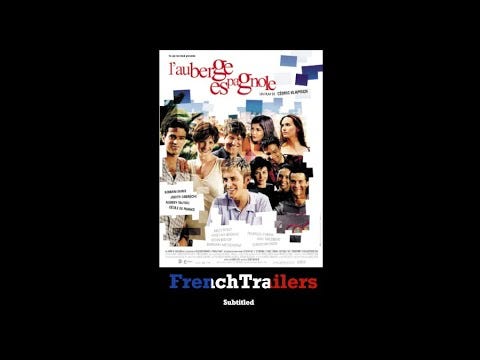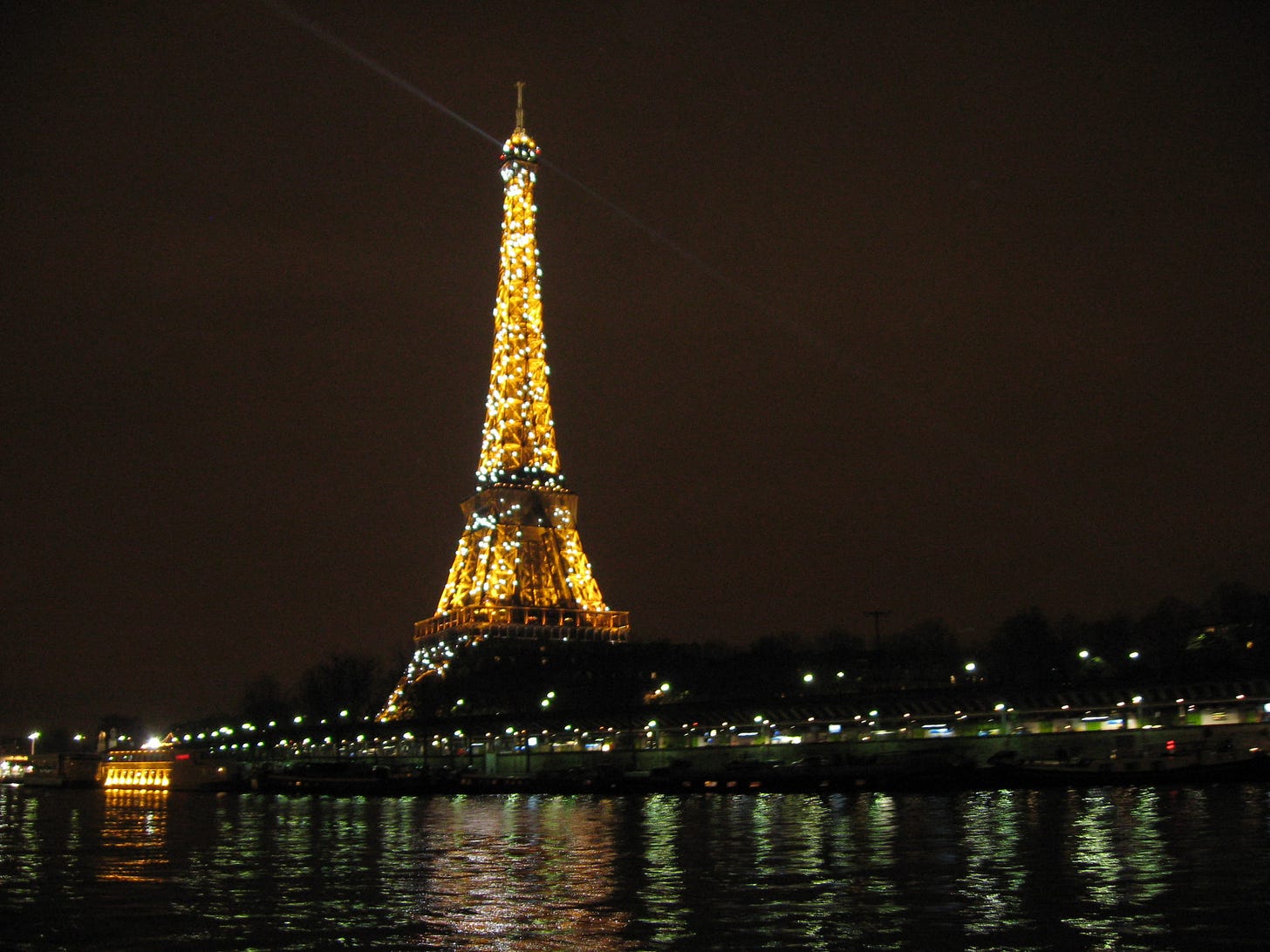Come in the middle? Here’re links to ➡️ Chapter One, Chapter 2, Chapter 3, Chapter 4, Chapter 5, Chapter 6, Chapter 7, Chapter 8, Chapter 9 , Chapter 10, Chapter 11, Chapter 12, Chapter 13, Chapter 14 , Chapter 15 , Chapter 16, Chapter 17, Chapter 18, Chapter 19, Chapter 20, Chapter 21, Chapter 22, Chapter 23, Chapter 24, Chapter 25 , Chapter 26, Chapter 27, Chapter 28, Chapter 29, Chapter 30, Chapter 31, Chapter 32
Forget Paris
I read in The Washington Post a movie review of Paris. Ann Hornaday says, “Cédric Klapisch’s intoxicating portrait of a city that, despite (or more likely, because of) being in a state of constant flux, retains timeless energy and allure.”
I’ve not seen the movie that is playing at E Street but I plan to go instead of going to Paris. It’s hard to go to the city of love without love. I’d been thinking of Paris because my daughter and son-in-law and granddaughter, hurtling onto five months and wowing the Parisians, are there.
Paris equals love: the too-oft used equation of the romantic comedy.
Hornaday to my surprise does not mention that Cédric Klapisch has directed two of my all-time favorite movies that I classify as Parisian romantic comedies—an off-classification that suits me perfectly because the rom-com that fits that term has too often lost its edge. These have not: L'Auberge Espagnole (filmed in Spain) and Russian Dolls (Paris, London, St. Petersburg) are edgy.
Meanwhile, as in yesterday, the CEO I’d met on the plane home from Australia—my Ezio Pinza (across a crowded room . . .)—wrote me again.
This time to say that his “love” has died. “My love” is the way he has always referred to the woman he was on his way to see when he met me on the plane from San Francisco to D.C., the woman he’d been dating since he met her on a high-end cruise—meaning not many people, small boat—after his wife had died.
Last we talked on the phone ever so briefly I told him things with D. were in flux and in play.
He writes, “I probably should not be sending this since our connection lapsed so long ago.” He explains what has happened and ends with, “It is as I said at the beginning, ‘I probably should not . . . his ellipsis].’ Yet at times like this, perhaps we need to cut ourselves a bit of slack.”
I sit in front of the e-mail: I ponder him. I ponder me. I ponder D. I reply with words about mourning, with my own realization that, as I say to him,
“I can only imagine how this loss has thrown you back into the déjà vu of your beloved wife. As to my husband [or rather D. as we know him here] I say that the story of our relationship “is an open book for all to read: I’m writing a blog, have been doing so for a year now.”
I wonder now about the CEO: A missed chance that was probably not a chance, that the CEO never allowed to be in his honorable stance and his privacy? I gather that he’s kept quite a distance from his east coast “love” as he lives comfortably with cook and housekeeper in Saratoga and retreats often to his house in Carmel—no phone, no computer—to paint and collect, perhaps for a book: the letters of his wife.
I wonder D.—as in, I worry him. His presence pervades this writing and, I now see, all the preceding chapters here. You don’t need to say it. I will: She’s not moved on.
As synchronicity would have it, as I was reaching for Joan Didion’s The Year of Magical Thinking and for T.S. Eliot’s Selected Poems because I sought something to quote to the CEO from these works, a small torn-edged card falls out of one of the books: the note from the brief encounter in the galley on the plane: his e-mail address and this line in his hand, “Cooking is an over-rated feminine attribute,” a reference to the title of my first book, the title that appeared in the margin of the blog, much as it appeared in the margin of my life (instead of celebration, separation).
I write to the CEO that virtually everyone describes grief as coming in waves—sudden and overwhelming.
I say that the death of a parent or a sibling, as I have lost both my parents and my sister, is like a break in the sea. Now I read this and see that my description of grief likens, oddly to love.
The miracle of Didion’s book is that she never once mentions the word love while she writes a love story. In her book, she describes the dailiness of her life with her husband; she has her own list.
I have mine: espresso and steamed milk in the morning. Cuban bread made quickly with three packages of dried yeast, the baked bread devoured with lightning speed what has lightened with time. Pea soup from Craig Claiborne’s New York Times Cookbook. Beef stewed in red wine and tomatoes, string beans added at the end. Fork-stirred omelets rolled onto his plate.
Didion quotes from Eliot’s “The Wasteland” with no reference; in others words, you either know the source or not: “These fragments I have shored against my ruins.” p. 190-1 in her book. This is line 431 in “The Wasteland,” in part V What the Thunder Said, three lines from the poem’s end.
The CEO ends his e-mail this way: “Incidentally, I’ve reread two poems you sent to me, ‘Leap Before You Look’ and ‘The Privilege of Being,’ . . . [his ellipsis] both compelling.”
The first is an all-time favorite of mine by Auden; the second, a poem by Robert Hass that has resonated throughout my life.
I now ponder whether either of these poems would fill up the ellipsis of time that has passed between me and this gorgeous seventy-ish, stylish, loyal, sensitive man.
I reread. The poems, as poetry magically does, answer:
In “Leap Before You Look,” Auden says, The sense of danger must not disappear, that we must not consent to never mention those who disappear and that although I love you, you will have to leap; /Our dream of safety has to disappear.
I like to think I have lived by these words, but knowing oneself is the work of a lifetime. So, who knows? But whether I have lived the words or not, they ring like bells. They answer.
Hass’s poem answers with stunning reality and Victorian swoon—Wisdom more often than not comprises paradox. In “Privilege of Being,” Hass talks of the angels up above in the unshaken ether and crystal of human longing as they watch those making love in that awkward pose of ecstasy and he reminds that life has limits, that people die young, fail at love, /fail of their ambitions.
But love is the human wish.
I think, Maybe Paris? More soon . . . (ellipsis mine).
Grateful acknowledgment is made to the following for permission to reprint previously published material in chapter 33:
W.H. Auden: Excerpts from "Leap Before You Look", copyright 1945 by W.H. Auden, copyright 1937 and renewed 1965 by W.H. Auden, from Collected Poems of W.H. Auden by W.H. Auden. Used by permission of Random House, Inc., and the Wylie Agency for the estate of W.H. Auden.
Robert Hass: Excerpt from "Privilege of Being", from Human Wishes by Robert Hass, copyright 1989 by Robert Hass, The Ecco Press by permission of the author.
Coming next: Chapter 34: “Hat Trick” Table of Contents
Love,






I "leaped" at the chance to read this next chapter of Mary's memoir. I always learn something about life, literature, and Mary. And like any compelling work, I'm always left wondering, what comes next? Mary's "cliffhangers" are always elegant.
Beautiful, Mary. This feels like a a thickening, not of the plot exactly, but more like that lovely beef stew you mention, seasoned with poetry, the wonderful book by Didion and that little sprinkle of Paris. Delicious.